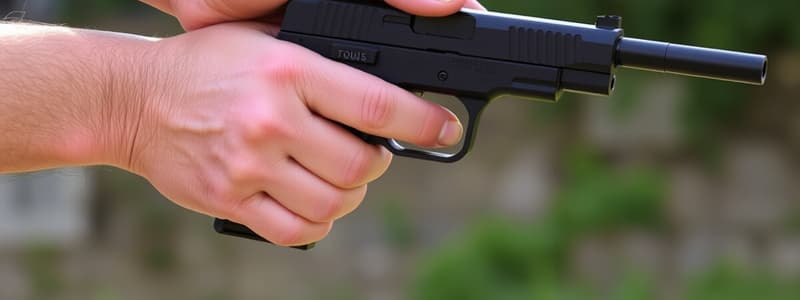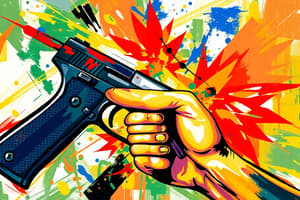Podcast
Questions and Answers
Which of the following is NOT one of the 6 rules of safety?
Which of the following is NOT one of the 6 rules of safety?
- Finger off the trigger until you're ready
- Treat all guns like they're loaded
- Fire guns in celebration (correct)
- Point in the safest position
You should assume that a gun is unloaded until proven otherwise.
You should assume that a gun is unloaded until proven otherwise.
False (B)
What should you do before shooting at your target?
What should you do before shooting at your target?
Check that the areas in front of and behind your target are safe.
What should you do if you want to handle firearms in an emotional state?
What should you do if you want to handle firearms in an emotional state?
You can fire your gun in celebration, like on the 4th of July.
You can fire your gun in celebration, like on the 4th of July.
Match the following rules with their descriptions:
Match the following rules with their descriptions:
Always keep your finger off the ______ until you are ready to shoot.
Always keep your finger off the ______ until you are ready to shoot.
Why should you never point a gun at yourself or another person?
Why should you never point a gun at yourself or another person?
Alcohol, drugs, and medication can be safely mixed with firearms.
Alcohol, drugs, and medication can be safely mixed with firearms.
What should you do if you are unable to check a gun to see if it is unloaded?
What should you do if you are unable to check a gun to see if it is unloaded?
Flashcards are hidden until you start studying
Study Notes
6 Rules of Safety
- Treat all guns as if they are loaded to ensure maximum safety.
- Always point the gun in a safe direction, ideally upwards where an accidental discharge would not cause harm.
- Keep fingers off the trigger until ready to shoot to prevent accidental discharges.
- Know your target and what's beyond it, ensuring the entire shooting area is safe.
- Be familiar with how to operate your gun, understanding its mechanics and functions.
- Store guns and ammunition separately for safety, utilizing locking devices.
Treat All Guns Like They're Loaded
- Always assume a gun is loaded and check it each time it is handled.
- If unsure how to check, do not handle the gun and seek help.
Point in the Safest Position
- Be conscious of where the gun is aimed, only pointing at intended targets.
- Never direct a gun towards yourself or others.
Finger Off the Trigger Until Ready
- Maintain finger discipline by keeping it off the trigger until intending to fire.
- Sudden movements or noises can lead to unintentional firings if the finger is on the trigger.
Know the Target, Surroundings, and Beyond
- Ensure the area around your target is safe to avoid harming unintended parties.
- Never shoot at ambiguous targets; if unsure, do not fire.
Know How to Operate Your Gun
- Familiarize yourself thoroughly with your specific gun model regarding loading, unloading, and clearing malfunctions.
- Consult with firearms experts for guidance specific to your make and model.
Store It Safely
- Utilize safety devices like trigger locks and store guns unloaded in secure containers.
- Keep ammunition stored separately to enhance safety.
Handling Firearms in Emotional States
- Avoid handling firearms when angry or emotionally unstable, as judgement may be compromised.
Celebratory Gunfire
- It is illegal and dangerous to fire guns into the air during celebrations; bullets can return with lethal force.
- Instead, target shooting should be directed at a secure, appropriate target.
Shooting at Water or Hard Surfaces
- Do not shoot at water or hard, flat surfaces to prevent ricochets that could cause injury.
Unloading Reciprocality
- Always handle guns when unloaded, ensuring the action is open for safety.
Alcohol, Drugs, and Medication
- Firearms and substances that impair judgement do not mix; avoid using or handling firearms while under the influence.
Eye and Ear Protection
- Always wear protective eyewear and earplugs while shooting, as firearms produce loud noise and ejected debris that can be harmful.
Studying That Suits You
Use AI to generate personalized quizzes and flashcards to suit your learning preferences.



